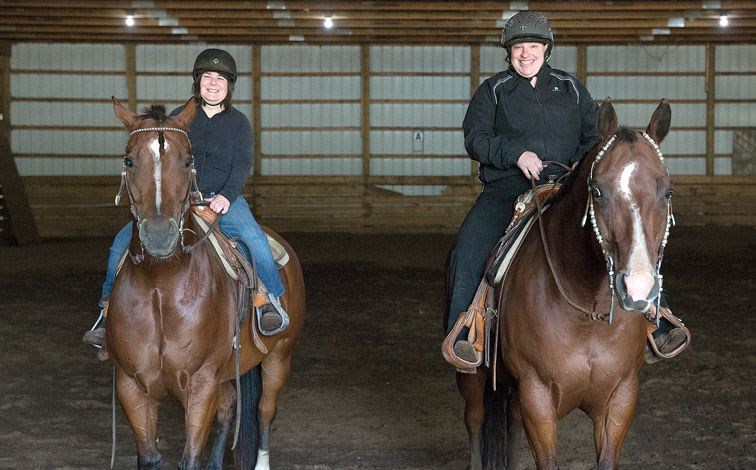When looking into the eyes of her nine-year-old quarter horse, Mister, it's more than just another training session for Lennise Mann.
"I've really learned to communicate with him and I'm always learning something new. We learn from each other," Mann said.
Mann began competing in western dressage four years ago and since then has flourished as a competitor but in Prince George, the sport continues to experience its ups and downs.
"Western dressage seems to be in a bit of a slump in Prince George right now. We want to get the word out so more people can learn about it," Mann said.
Her instructor, Rochelle Van Geloven, agrees, saying that there have been surges.
"This year it's been particularly low," Van Geloven said. "We have about three shows a year, but without enough competitors, we are just unable to compete."
Van Geloven has been training in dressage for about 23 years.
"I've always enjoyed dressage. And I love that I can train at higher levels. And western dressage is new. I like that I can compete with myself. You can always improve and that's what you aim for," she said.
Western dressage emerged from the original "equestrian dressage" which is the highest expression of classical horse training where horse and rider are expected to perform, from memory, a series of predetermined movements.
Western dressage combines the principles of dressage riding with the use of western tack.
Riders typically wear western attire complete with cowboy boots and jeans.
All horse breeds are allowed to compete.
"Western dressage was developed for horses like stock or quarter horses, for horses that wouldn't normally have the opportunity to compete in dressage," Mann said.
And for Van Geloven, the opportunity to add some "bling" is always there for those looking to brighten things up.
"More and more people are into the western look and you can add as much bling as you like. But it's also about safety. Some people just feel safer in a western saddle," she said.
For Van Geloven, western dressage always offers an opportunity for improvement.
"It's about your horse and how it moves overall. There's always room to grow."
For Mann, the opportunity to work with Van Geloven has taught her skills which will stay with her for life.
"I didn't grow up with horses but I've always loved them. I volunteered at a horse rescue and that's how I found out about Rochelle about eight years ago. And I've been taking lessons with her ever since," Mann said.
"She knows when to push you and when to back off. And she knows how to read your horse. She is your cheerleader, always helping you reach your goals and is always encouraging you to do your best."
According to Van Geloven, anyone can become involved especially those who train with horses regularly.
"It's not something strange or bizarre and anyone from children to adults can try it. There are always beginner levels offered," she said.
"And there is a lot of flexibility. Beginners don't need to memorize your tests. Someone is always available to read for you if needed so you can follow ahead of time."
During shows, competitors always have a set planned time scheduled.
"This is so convenient during shows because it's planned. Everyone has such busy lives today and with these shows, there's no waiting around. Your time is your time and friends and family can come out and watch you too."
The Western Style Dressage Association of Canada is a registered not-for-profit corporation in Canada.
Its mission is to honour the horse and the diversity of all breeds while valuing all levels of riders and the partnership they share with their horse.
"There is also some flexibility when competing," Van Geloven said.
"Every movement is scored and if you do happen to mess up, you can always make it up. No one wants to see anyone fail in western dressage. Everyone is so supportive."
Western dressage is also designed to improve the connection between horses and their experienced riders.
"It's as though you and your horse are intertwined. Your movements become one with your horse, each and every one is connected," Van Geloven said.
And as for the rider, the sport offers discipline and focus as well as physical flexibility.
"It gives riders focus and challenges them because they take full control of their horse," she said. "And for kids, well they just love horses. My daughter rides and to see the relationship between her and her horse, it's so beautiful. That bond, you can't ask for more."
The Autumn Show: Cadora Dressage Competition, a B.C. 2018 Summer Games qualifier will take place on
Sept. 16-17 at the Prince George Agriplex for those interested in seeing what western dressage is all about.



